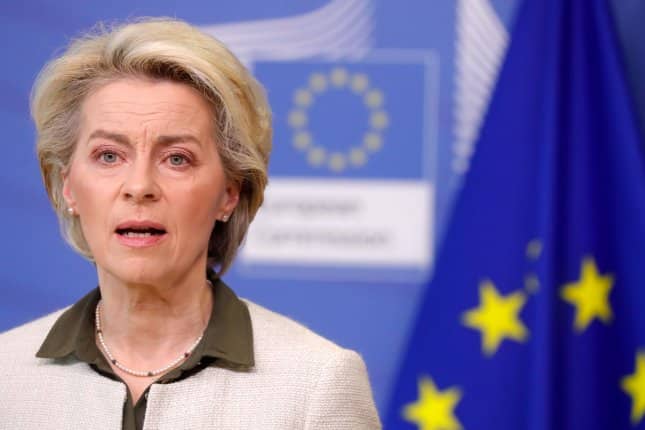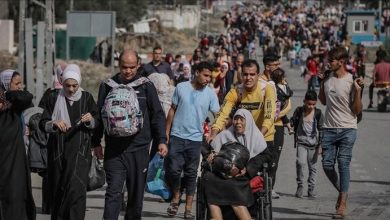EU proposes complete ban on Russian oil in sixth sanctions package

The head of the European Union on Wednesday proposed to member states a complete ban on Russian oil as part of the bloc’s sixth sanctions package to be levied against Russia over its war in Ukraine.
“This will be a complete import ban on all Russian oil, seaborne and pipeline, crude and refined,” European Commission President Ursula von der Leyen told the European Parliament.
The ban, she said, will maximize pressure on Russia while minimizing collateral damage to member states and their parters worldwide.
“To help Ukraine, our own economy has to remain strong,” she said.
▫ Listing of high-ranking military officers
▫ De-swifting major Russian banks
▫ Banning state-owned broadcasters
▫ Phasing out Russian oilToday we are presenting the 6th package of sanctions.
Speech by @vonderleyen at #EPlenary. #StandWithUkraine https://t.co/0N8YG0iHol
— European Commission 🇪🇺 (@EU_Commission) May 4, 2022
The 27-member bloc had vowed in March to reduce dependency on Russian energy and banned Russian coal early last month as part of its fifth sanctions package against the Kremlin.
The EU head addressed in her remarks to parliament on Wednesday that the oil ban will be difficult with some member states greatly dependent upon Russia for their energy supply.
According to a report produced by the union last month, 27% of its oil imports, 40% of its total gas consumption and 46% of its coal came from Russia with energy accounting for 62% of EU total imports from the country at a cost of $104 billion.
“Let’s be clear: It will not be easy because some member states are strongly dependent on Russian oil, but we simply have to do it,” she said.
Along with the oil ban, the sanctions package also includes punitive measures imposed against high-ranking military officers and those responsible for the siege on the city of Mariupol and who’ve committed war crimes in Bucha, a city that has come to represent the brutality of Russia’s war.
Ukrainian prosecutors have filed charges against Russian soldiers for committing war crimes in the city near the capital Kyiv while the United Nations high commissioner of Human Rights said it documented during its one-day trip to the city unlawful killings, including summary executions of 50 civilians.
Von der Leyen said hitting those who committed war crimes in Bucha and the siege of Mariupol with sanctions “sends another important signal to all perpetrators of the Kremlin’s war: We know who you are, and you will be held accountable.”

The package will also remove Sberbak, the largest back in Russia, from the SWIFT international payment system that connects banks worldwide.
She also proposed the banning of three Russian state-owned broadcasters from EU airways including from cable, satellite, Internet and smartphones.
The channels have been identified by the EU as mouthpieces that amplify Putin’s message, she said, adding they will also cut the Kremlin off from European accountants, consultants and “spin-doctors.”
With these combined sanctions, the EU will be depriving the Russian economy from the ability to diversify and modernize, she said.
“Putin wanted to wipe Ukraine from the map. He will clearly not succeed,” she said. “On the contrary: Ukraine has risen up in unity, and it is his own country, Russia, that Putin is sinking.”
Russia launched its invasion of Ukraine on Feb. 24 under the pretext to denazify and demilitarize the country.
Since then, nearly 3,200 Ukrainian civilians have been killed and nearly 5.6 million have been forced to flee the country, according to United Nations data.
Along with the EU, democratic nations such as Britain, Canada and the United States have repeatedly leveled punitive measures including sanctions against Russia, which have already taken a bit out of Moscow’s economy.
The sanctions package proposed by von der Leyen on Wednesday will be debated and voted on by member states before it can be enacted.
According to the European Council, the EU has sanctioned 1,093 people and 80 entities in connection to Russia’s aggression against Ukraine going back to March of 2014 when Moscow annexed Crimea.





